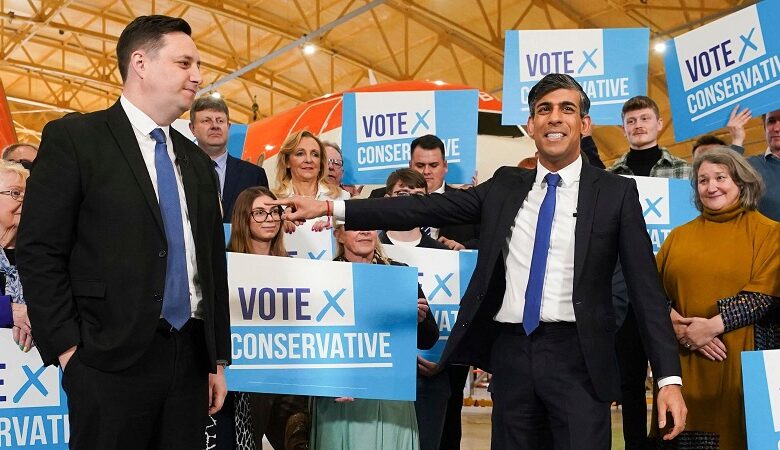UK Conservatives Face Record Low Vote Share as Labour Extends Lead

News Mania Desk/ Agnibeena Ghosh/18th June 2024
The Conservative Party in the United Kingdom has plummeted to its lowest vote share since the final days of Theresa May’s premiership, prompting dire warnings that the party is nearing “electoral extinction.” Recent polling data by Savanta for The Telegraph reveals that the Tories are at a mere 21 percent – the lowest level recorded by the pollster since May 2019, when Theresa May’s government was immobilized by the Brexit impasse. In stark contrast, Labour has expanded its lead over the Conservatives to its highest point during Rishi Sunak’s time as Prime Minister, while Reform UK has seen its vote share rise to an all-time high in a Savanta poll.
Conducted between June 12 and 14, the poll shows Labour gaining two points to reach 46 percent, while the Conservatives have dropped four points to 21 percent. Reform UK surged by three points to 13 percent, its highest share since the party’s inception in January 2021. The Liberal Democrats also saw a two-point increase, reaching 11 percent. Meanwhile, the Green Party rose by one point to 5 percent, and the SNP fell by one point to 2 percent.
This latest poll concludes another challenging week for Prime Minister Sunak, following an earlier poll indicating that Reform UK had overtaken the Conservatives for the first time. Chris Hopkins, Savanta’s political research director, warned, “Our research suggests that this election could be nothing short of electoral extinction for the Conservative Party. The hopes of Conservative candidates are being shot to pieces by poll after poll showing the Conservative Party in increasingly dire straits – and we’re only halfway through the campaign.”
Hopkins further cautioned that the situation could deteriorate even more for the Conservatives, especially with postal votes about to be dispatched to millions of households. “Time is already close to running out for Rishi Sunak,” he noted.
The Savanta poll also examined public perceptions of which party would likely raise various taxes, including capital gains tax, corporation tax, and inheritance tax. Despite the Conservatives’ aggressive campaign against Labour on taxation, more than half of the respondents believed that Labour would be more likely to increase these taxes compared to the Conservatives. Specifically, 55 percent thought Labour would raise corporation tax, compared to 28 percent for the Conservatives. Similar patterns were observed for inheritance tax (54 percent vs. 27 percent), capital gains tax (53 percent vs. 30 percent), income tax (51 percent vs. 36 percent), and national insurance (50 percent vs. 32 percent).
Even among Labour voters, about half acknowledged that their party was more likely to increase corporation tax, capital gains tax, and inheritance tax. However, when asked about several key Conservative manifesto promises, including abolishing stamp duty for first-time buyers on homes up to £425,000, respondents were more likely to view these pledges positively. Despite this, a significant majority expressed distrust in the Conservatives’ ability to deliver on these promises.
Hopkins highlighted the core issue facing the Conservatives, stating, “While it’s priced in that Labour will raise some taxes, and the Conservative manifesto has some well-liked ideas, the public no longer trusts the Conservatives to deliver on anything they say, including some reasonably popular manifesto policies.”
The poll also touched on the Conservative stance on the European Convention on Human Rights (ECHR), with 57 percent of respondents favoring the UK’s continued membership compared to 28 percent who supported leaving.
Regarding recent comments by Energy Secretary Claire Coutinho about the risk of blackouts if fossil fuels are removed from UK electricity by 2030, 49 percent of respondents agreed with her assessment, while 37 percent disagreed.
Lastly, following Prime Minister Sunak’s appeal to veterans for understanding after he left D-Day commemorations early, 61 percent of respondents believed veterans would not forgive him, with only 22 percent thinking they would. Those aged 65 and over were somewhat more forgiving, but 58 percent still held that veterans would not pardon the Prime Minister.
With these trends, the Conservative Party faces an uphill battle as it navigates the remainder of the election campaign, struggling to regain public trust and voter support amidst a rapidly shifting political landscape.






